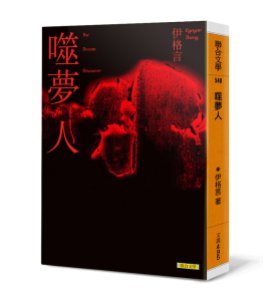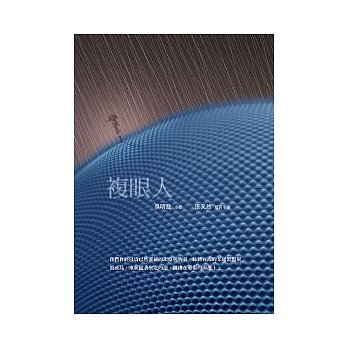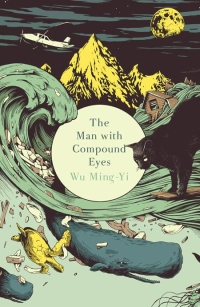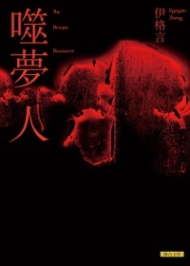 I was first asked to translate an excerpt from this book by author Egoyan Zheng for eRenlai, and it was only later that I realized that it was in fact an excerpt from a full-length novel – somewhat of a rarity in Chinese language fiction. A lot of Taiwanese fiction focuses on the contrast between modernity and tradition or queer themes, which meant this intercontinental science fiction spy romp set in the future, with a serious psychological edge to it, came as a bit of a bolt from the blue for me. The book still touches on the identity issues of the “Taiwanese condition,” but in a way that can be applied to global issues.
I was first asked to translate an excerpt from this book by author Egoyan Zheng for eRenlai, and it was only later that I realized that it was in fact an excerpt from a full-length novel – somewhat of a rarity in Chinese language fiction. A lot of Taiwanese fiction focuses on the contrast between modernity and tradition or queer themes, which meant this intercontinental science fiction spy romp set in the future, with a serious psychological edge to it, came as a bit of a bolt from the blue for me. The book still touches on the identity issues of the “Taiwanese condition,” but in a way that can be applied to global issues.
The book is set against the background of an eerie new world order (for the Taiwanese reader this may be a not-so-subtle imaginary of expanded Chinese power, although for Western readers it finds more resonance in the NSA prism spying scandal.) The book employs the science fiction trope of an enslaved and persecuted sub-race of “biosynthetics”. This has been seen a lot in science fiction movies, but instead of a robot race, or artificial intelligence, the subjects are clones educated and emotionally stunted through the use of dreams. The author’s brief stint as a student of psychology at National Taiwan University, before he dropped out and read Chinese Literature at Tamkang University stands out here, as Lacan and Freud remain popular among university professors in Taiwan and psychoanalytic theory features heavily in their literary graduate courses. The race of biosynthetics are emotionally stunted as a result of a complicated dream process with which they are educated to obey mankind.
What stands out about this book is the world built for the audience in the various footnotes – some of which extend for several pages – in a more lively fashion than Tolkien, Zheng explores everything from performance artists who genetically engineer a real life Hello Kitty, with no mouth that has to be fed through a nose tube, to a race of blind dwarfs that has seemingly been isolated from mankind for thousands of years, but suspiciously speaks a tongue remarkably similar to English, and the future of the porn industry, with porn stars becoming obsolete with heightened virtual reality. All of them relate to the story-line, however, and are not just random interruptions to the main text, and provide vital clues in the protagonist’s struggle for the “truth”.
The protagonist, K, is a double – some would say triple – agent. The world through K’s eyes is emotionally stunted, as the life of a biosynthetic should be, as dictated by the dreams that raised them. He struggles with pseudo-schizophrenic hallucinations and personality disorders however, and embarks on a major turning point in his life, when he is confronted with the mysterious Godel, and when he realizes that he is going to be discovered as a biosynthetic posing as a human, thanks to a surprise check on his agency, and a test that he is unable to cheat successfully.
K has aspects of a film noir hero, which in combination with his “shallow” emotional range, gives him an almost autistic character which leaves him disconnected from everyone. We see him struggle to rediscover the secret that lies behind his schizophrenic episodes with a hope that some depth lies behind his robotic facade. Alongside the protagonist, we begin to question his drive to become human, and cheer him on as he begins to work with the Biosynthetic Liberation Front, in their struggle against human hegemony.
Love also plays a role in the book, a key building block in K’s construction of a “normal human life”, something he has desired since he found himself abandoned in a derelict building, and later a major factor in his questioning of this drive within himself. The book’s puzzling denouement will leaves you with two conflicting opinions of what exactly has been going on and will have you thinking about it for days.
To elaborate on what I described as the Taiwanese issues brought up in the book, they include nuclear power issues, animal rights issues, identity issues and intelligence concerns.
The book includes a scene where K hallucinates that he sees a child being consumed by the nuclear explosion in Hiroshima in 1945 – a theme which he develops in his new book, Ground Zero, set in the wake of a modern nuclear holocaust. The issue of nuclear power, and specifically the opening of a fourth nuclear power plant on Taiwan, which has been pushed for by the ruling KMT, has been a hot button topic in Taiwan, with large-scale protests occurring in the wake of the Fukushima Daiichi nuclear disaster in Japan, including the participation of prominent scholars and activists. The stop-start progress of the fourth nuclear plant is summarized here, although the referendum has still failed to materialize. An alternative look at the nuclear issue can be seen at eRenlai, in their No Nuke No Future focus.
Another issue which features prominently in the book is animal rights. This pertains not only to cruelty to animals, but also to genetic manipulation and the murky line between animals and humans. Animal rights are an important issue for many Taiwanese people, as Huang Zong-hui states in an interview she did with me for eRenlai:
[youtube http://www.youtube.com/watch?v=uKD2usyhMdo&w=560&h=315]
The anti-China tendency of the recent protests against the KMT’s attempt to force a cross-strait trade-in-services pact through the legislature is representative of a general fear of the Communist Party leadership of China, which takes shape in the novel as a new world order government, shrouded in mystery. Outside of the cross-strait context, the espionage resonates with the revelations of Edward Snowden about the US’s NSA spying program.
Overall, this book is a thrilling read, and running through it is a conspiracy that will keep you turning pages, and thumbing through footnotes.





